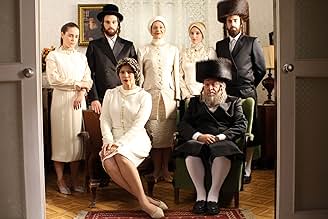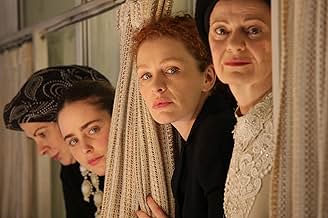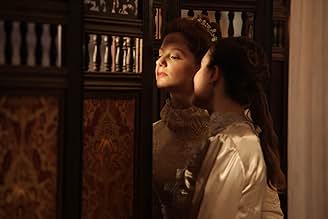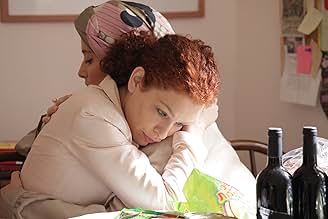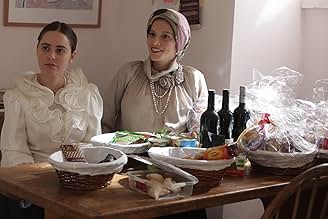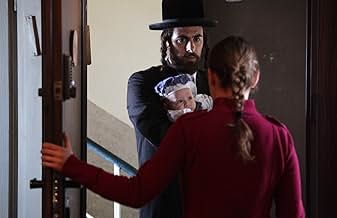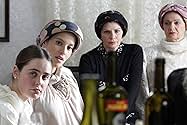IMDb-BEWERTUNG
6,7/10
4056
IHRE BEWERTUNG
Eine junge chassidische jüdische Frau wird zu einer arrangierten Leviratsehe mit einem älteren Witwer gezwungen.Eine junge chassidische jüdische Frau wird zu einer arrangierten Leviratsehe mit einem älteren Witwer gezwungen.Eine junge chassidische jüdische Frau wird zu einer arrangierten Leviratsehe mit einem älteren Witwer gezwungen.
- Auszeichnungen
- 14 Gewinne & 16 Nominierungen insgesamt
Empfohlene Bewertungen
Put aside what you think you know or don't know about the inner world of an orthodox Chassidic community in Tel Aviv, and let Rama Burshtein weave a story that is believable, engrossing, and rich with nuance and subtlety... the timeless themes found in a community which lives in the past, the excellent acting, direction and casting, will have you quickly absorbed in this terrific film.
If you are looking to vent your critique or holier than thou judgments of Jewish Orthodoxy, you may feel a bit humbled by the humanity found behind the long dresses, black robes and covered heads. The portrayal of the rabbi is an especially tender reflection of some one who is indeed spiritual, in the most human sense.
If you are looking to vent your critique or holier than thou judgments of Jewish Orthodoxy, you may feel a bit humbled by the humanity found behind the long dresses, black robes and covered heads. The portrayal of the rabbi is an especially tender reflection of some one who is indeed spiritual, in the most human sense.
10Red-125
The Israeli film Lemale et ha'halal was shown in the United States with the title "Fill the Void" (2012). It was written and directed by Rama Burshtein. Other films exist about highly observant Jews, both in Israel and the U.S. However, this movie is unusual because the director herself if part of the orthodox community. She knows how people act, what they say, how they celebrate, and how they mourn.
As in many communities where a woman's outside options are limited, marriage is a central and crucial moment in their lives. Matches are arranged, but the woman always has the right to turn down a prospective suitor. Even so, the decision about whom to marry is critically important.
The wonderful young Israeli actor Hadas Yaron plays Shira, whose time for marriage has come. A match has been made, and Shira is excited about meeting the young man and, presumably, falling in love with him. Then tragedy strikes. Shira's loving older sister dies in childbirth, leaving behind a baby boy and a widower. In order to keep the family together, it is suggested that Shira marry the baby's father. He appears to be a fine man, but he's older than she is. Also, as Shira points out, she had dreams of exploring marriage with a young man, not with a previously-married man who has a child.
It would have been easy for the director to craft a story where the whole community is pushing Shira to marry Yochay, her late sister's widower. That's not how the film was crafted. Everyone respects Shira's right to decide, and Yochay isn't desperate, either. A match has been made for him with a woman from Belgium. (The problem is that he'd have to move to Belgium to be with her, and, of course, he'd take his infant son with him.)
You'll have to see the film to find out what happens next. However, the movie is far more than just a vehicle for a plot. It's an intimate look into the lives of the ultra-orthodox, and into the heart and mind of a young woman who wants to do what is right, but also what is best.
Fill the Void won six Israeli Academy Awards, including Best Actress, Best Director, and Best Film. Hadas Yaron won the Best Actress award at the 2012 Venice Film Festival.
We saw this film at Rochester's Dryden Theatre as part of the exceptional Rochester Jewish Film Festival. I think it will work better on a large screen than on DVD, but it's worth searching for it and seeing it on a small screen if necessary. For reasons I can't understand, this movie has a lukewarm IMDb rating of 6.6. Why? It's a brilliant film and deserves to be seen. Ignore the low rating, and don't miss "Fill the Void."
As in many communities where a woman's outside options are limited, marriage is a central and crucial moment in their lives. Matches are arranged, but the woman always has the right to turn down a prospective suitor. Even so, the decision about whom to marry is critically important.
The wonderful young Israeli actor Hadas Yaron plays Shira, whose time for marriage has come. A match has been made, and Shira is excited about meeting the young man and, presumably, falling in love with him. Then tragedy strikes. Shira's loving older sister dies in childbirth, leaving behind a baby boy and a widower. In order to keep the family together, it is suggested that Shira marry the baby's father. He appears to be a fine man, but he's older than she is. Also, as Shira points out, she had dreams of exploring marriage with a young man, not with a previously-married man who has a child.
It would have been easy for the director to craft a story where the whole community is pushing Shira to marry Yochay, her late sister's widower. That's not how the film was crafted. Everyone respects Shira's right to decide, and Yochay isn't desperate, either. A match has been made for him with a woman from Belgium. (The problem is that he'd have to move to Belgium to be with her, and, of course, he'd take his infant son with him.)
You'll have to see the film to find out what happens next. However, the movie is far more than just a vehicle for a plot. It's an intimate look into the lives of the ultra-orthodox, and into the heart and mind of a young woman who wants to do what is right, but also what is best.
Fill the Void won six Israeli Academy Awards, including Best Actress, Best Director, and Best Film. Hadas Yaron won the Best Actress award at the 2012 Venice Film Festival.
We saw this film at Rochester's Dryden Theatre as part of the exceptional Rochester Jewish Film Festival. I think it will work better on a large screen than on DVD, but it's worth searching for it and seeing it on a small screen if necessary. For reasons I can't understand, this movie has a lukewarm IMDb rating of 6.6. Why? It's a brilliant film and deserves to be seen. Ignore the low rating, and don't miss "Fill the Void."
10clg238
This is a gorgeous film. The cinematography, largely revealing closeups of the characters, is stunning, bringing us close in to an unfamiliar world, an insular, deeply religious culture. The acting is flawless. But what brings me to give this film a top rating is the story, one of moral complexity--life, after all, is complicated, a truism that Hollywood films fail miserably in addressing, the rare times they attempt to do so (perhaps "The Master" and "Doubt" are exceptions). A young, innocent woman desires to make a marriage match that is in accordance with her Jewish Orthodox tradition and yet in some ineffable way is personally to her taste. At first this seems possible, but unforeseen circumstances make her choice of marriage partner difficult. She is not just choosing for herself and potential partner but her choice is central to the happiness or unhappiness of relatives and friends—a situation of which she is acutely aware. How can she make the right choice for everyone, herself included? In a culture seeped in moral values, the moral answer to her dilemma is not an easy one. It has been a long time since I've been so deeply moved by a film.
Gets _way_ further inside the world of the "Orthodox Jew" than anything I've ever even heard about before. The director and some of the actors really are Orthodox, so the portrayals of both home life and ceremonies that are seldom photographed are truly accurate, not just informed guesses. Yet this is not an "ethnographic record", it's a feature film. And the cinematography is excellent, about as far from an "amateur home movie" as you could possibly get.
The glass-half-full description is "a character study" - the glass-half-empty description is "slow boiler". Those prone to getting fidgety will probably be tested beyond their endurance. The psychological nuances aren't trivial - this film is the official submission of Israel to the Best Foreign Language Film for the Academy Awards.
The treatment of women looks "old-fashioned" to us: separate rooms, hair covering, emergency health care workers restricted if they might see something they normally wouldn't ...all the horror stories we've heard. This deeper look though shows us the considerable adaptation and flexibility around those rules-- architecture modified so those separate rooms aren't all that separate, a spinster covering her hair on the advice of her rebbe even though she'd never been married so people wouldn't ask so many awkward questions, the wife controlling the money in a rebbe's household, arranging clandestine peeks at potential mates via cellphone. The clumps of women standing in doorways reminded me powerfully of the clumps of servants in those Manor House period piece films like Gosford Park. The blocking of access to females in physical distress reminds me of stories out of Saudi Arabia. And the photo I saw later of a "fashion designer" Muslim hair covering looked so much like what these Orthodox women wear I did a double-take.
No easy answers, no "good guys" and "bad guys". There are both pros and cons. Downsides include difficulty finding a marriage partner, great difficulty keeping widows and widowers within the community, birth defects apparently from genetic inbreeding, and almost complete loss of input into the direction of the surrounding society/economy. Upsides include very strong support from both family and friends, and unparalleled community closeness. Where else do non-relatives easily call other adults by their pet names when the going gets rough? And how often do family friends feel free to proffer a word of contrary advice at any time? And although someone's decision to move away is often somewhat painful to others, where else would people literally rather die?
Beforehand I was ready to keep my distance and laugh at "those silly people". But watching it I realized the film applies equally well to _all_ communities that are "in the world but not of the world": fundamentalist Christians; even hippies who've resigned themselves to having zero political influence. There's a whole lot of space in the middle on the line with "modern society" on one end and "a cult" on the other end. Although on the surface this film is about a particular world that's about as familiar to me as living on Mars, the deeper story of gaining community but losing interaction with the surrounding society/economy still has me ruminating days later.
The glass-half-full description is "a character study" - the glass-half-empty description is "slow boiler". Those prone to getting fidgety will probably be tested beyond their endurance. The psychological nuances aren't trivial - this film is the official submission of Israel to the Best Foreign Language Film for the Academy Awards.
The treatment of women looks "old-fashioned" to us: separate rooms, hair covering, emergency health care workers restricted if they might see something they normally wouldn't ...all the horror stories we've heard. This deeper look though shows us the considerable adaptation and flexibility around those rules-- architecture modified so those separate rooms aren't all that separate, a spinster covering her hair on the advice of her rebbe even though she'd never been married so people wouldn't ask so many awkward questions, the wife controlling the money in a rebbe's household, arranging clandestine peeks at potential mates via cellphone. The clumps of women standing in doorways reminded me powerfully of the clumps of servants in those Manor House period piece films like Gosford Park. The blocking of access to females in physical distress reminds me of stories out of Saudi Arabia. And the photo I saw later of a "fashion designer" Muslim hair covering looked so much like what these Orthodox women wear I did a double-take.
No easy answers, no "good guys" and "bad guys". There are both pros and cons. Downsides include difficulty finding a marriage partner, great difficulty keeping widows and widowers within the community, birth defects apparently from genetic inbreeding, and almost complete loss of input into the direction of the surrounding society/economy. Upsides include very strong support from both family and friends, and unparalleled community closeness. Where else do non-relatives easily call other adults by their pet names when the going gets rough? And how often do family friends feel free to proffer a word of contrary advice at any time? And although someone's decision to move away is often somewhat painful to others, where else would people literally rather die?
Beforehand I was ready to keep my distance and laugh at "those silly people". But watching it I realized the film applies equally well to _all_ communities that are "in the world but not of the world": fundamentalist Christians; even hippies who've resigned themselves to having zero political influence. There's a whole lot of space in the middle on the line with "modern society" on one end and "a cult" on the other end. Although on the surface this film is about a particular world that's about as familiar to me as living on Mars, the deeper story of gaining community but losing interaction with the surrounding society/economy still has me ruminating days later.
Israeli director Rama Burshtein's powerfully moving Fill the Void, Israel's submission to the 2012 Oscars, is about love and marriage but, in the Orthodox Hasidic community in Tel Aviv, they do not necessarily go together like a horse and carriage. Hadas Yaron, winner of the Best Actress Award at the Venice Film Festival in her first film role, is eighteen year-old Shira who is very close to being matched and promised to a local young man. When her older sister Esther (Renana Raz) dies in childbirth, however, her husband, the striking-looking Yochay (Yiftak Klein), is left to raise his young son Mordecai by himself and, according to tradition, has a duty to remarry once the formal mourning period is over.
This is where the film's central dilemma comes in and Shira's choice to "do the right thing" is severely tested by conflicting loyalties. After her family celebrates the Jewish holiday Purim, Shira and her mother, Rivka (Irit Sheleg) in a scene with Woody Allen overtones, are sent by the matchmaker to "shop" in the supermarket to find a suitable husband. When the right man is found, arrangements are made, even though Shira does not actually meet the young man until later in the film. When her mother learns that Yochay has a marriage offer from a widow living in Belgium, however, and cannot face the idea of the baby being taken away, she asks the matchmaker Mr. Shtreicher (Michael David Weigl) to arrange for Shira to marry Yochai, who is ten years older.
Fill the Void is a heartfelt and intimate look inside a world few of us ever have contact with. Sensitive to the orthodox community's rituals and traditions, however anachronistic they may seem to us, there is a feeling behind the rituals that binds people together and produces a feeling of closeness in the community, underscored by the rhythmic chants and joyous celebrations of special occasions. Though the purpose of every girl is to be married may seem offensive, in the culture in which it takes place, it is not demeaning, and the film does not stand in judgment of its characters or of the community.
As director Rama Buhrstein, a member of the Orthodox community herself, describes the film, "It's not about being an anthropologist or about religion or secularism. Rather, it's about the heart." Shira is asked to choose between her sense of duty to her family and community and her desire to fulfill her own dreams. Throughout the process, however, she is not alone and is always surrounded by love and support from mothers, fathers, aunts, rabbis, even though their advice may be conflicting. Her affectionate Aunt Hanna (Razia Israeli), who never married because of a disability, encourages Shira to do what is right for herself, putting her at odds with her mother.
Shira's older unwed cousin Frieda (Hila Feldman) tells her that it was Esther's wish that she marry Yochay if anything should happen to her, a proposition Yochay rebels at. Sensing Shira's confusion and uncertainty about marrying Yochay, however, the chief Rabbi (Melech Thal) refuses to bless the marriage. Even as many emotions seem to be happening all at the same time, the resolution of the conflict is poignant and even beautiful and it all comes together in a memorable final shot.
This is where the film's central dilemma comes in and Shira's choice to "do the right thing" is severely tested by conflicting loyalties. After her family celebrates the Jewish holiday Purim, Shira and her mother, Rivka (Irit Sheleg) in a scene with Woody Allen overtones, are sent by the matchmaker to "shop" in the supermarket to find a suitable husband. When the right man is found, arrangements are made, even though Shira does not actually meet the young man until later in the film. When her mother learns that Yochay has a marriage offer from a widow living in Belgium, however, and cannot face the idea of the baby being taken away, she asks the matchmaker Mr. Shtreicher (Michael David Weigl) to arrange for Shira to marry Yochai, who is ten years older.
Fill the Void is a heartfelt and intimate look inside a world few of us ever have contact with. Sensitive to the orthodox community's rituals and traditions, however anachronistic they may seem to us, there is a feeling behind the rituals that binds people together and produces a feeling of closeness in the community, underscored by the rhythmic chants and joyous celebrations of special occasions. Though the purpose of every girl is to be married may seem offensive, in the culture in which it takes place, it is not demeaning, and the film does not stand in judgment of its characters or of the community.
As director Rama Buhrstein, a member of the Orthodox community herself, describes the film, "It's not about being an anthropologist or about religion or secularism. Rather, it's about the heart." Shira is asked to choose between her sense of duty to her family and community and her desire to fulfill her own dreams. Throughout the process, however, she is not alone and is always surrounded by love and support from mothers, fathers, aunts, rabbis, even though their advice may be conflicting. Her affectionate Aunt Hanna (Razia Israeli), who never married because of a disability, encourages Shira to do what is right for herself, putting her at odds with her mother.
Shira's older unwed cousin Frieda (Hila Feldman) tells her that it was Esther's wish that she marry Yochay if anything should happen to her, a proposition Yochay rebels at. Sensing Shira's confusion and uncertainty about marrying Yochay, however, the chief Rabbi (Melech Thal) refuses to bless the marriage. Even as many emotions seem to be happening all at the same time, the resolution of the conflict is poignant and even beautiful and it all comes together in a memorable final shot.
Wusstest du schon
- WissenswertesHadas Yaron had to lie to get out of her military duty to audition for the film.
- VerbindungenFeatured in At the Movies: Venice Film Festival 2012 (2012)
- SoundtracksIm Eshkachech Yerushalayim
(uncredited)
Top-Auswahl
Melde dich zum Bewerten an und greife auf die Watchlist für personalisierte Empfehlungen zu.
- How long is Fill the Void?Powered by Alexa
Details
Box Office
- Bruttoertrag in den USA und Kanada
- 1.775.316 $
- Eröffnungswochenende in den USA und in Kanada
- 59.164 $
- 26. Mai 2013
- Weltweiter Bruttoertrag
- 3.197.615 $
- Laufzeit
- 1 Std. 30 Min.(90 min)
- Farbe
- Sound-Mix
- Seitenverhältnis
- 2.35 : 1
Zu dieser Seite beitragen
Bearbeitung vorschlagen oder fehlenden Inhalt hinzufügen







